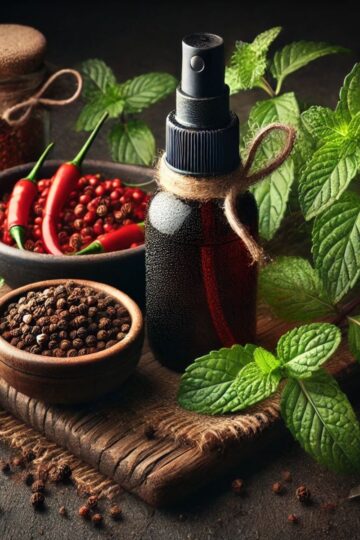Plastic has woven itself seamlessly into our daily lives, from the bottles we drink from to the clothes we wear. It’s even found in our oceans and, shockingly, in the seafood we eat. Reflecting on how deeply embedded plastic is in our routines, many of us wonder if we can ever fully eliminate it. While going completely plastic-free is challenging, taking mindful steps toward reducing our plastic use can make a meaningful impact.

In a world that often prioritizes convenience, plastic has become the go-to for ease and affordability. But if we wish to live more intentionally and create a gentler footprint, there are simple, practical ways to start. Let’s explore how to cut back on plastic use with these easy, sustainable swaps.
1. Embrace Tap Water Over Bottled Water
Choosing tap water over bottled water is an impactful switch. A good water filter, like a Berkey or reverse osmosis system, helps ensure clean drinking water. Carrying a reusable stainless-steel water bottle keeps you hydrated and reduces single-use plastic.
2. Use Reusable Shopping Bags
When shopping, bring your own reusable bags to reduce reliance on plastic. Many stores still offer plastic bags, but with a little preparation, you can avoid them altogether. Some places even charge for bags, serving as a gentle reminder to go plastic-free.
3. Make Your Own Reusable Cling Wrap
Swap plastic wrap for homemade cling wrap made from cloth. It’s a rewarding project that helps keep your kitchen free from single-use plastic. Look up a tutorial to get started, and enjoy this eco-friendly alternative.
4. Buy Bulk Fair Trade Coffee
Buying coffee in bulk can significantly reduce packaging waste. Use paper sacks from your store or bring your own reusable bag. Choosing fair trade options supports sustainable practices while reducing plastic in packaging.

5. Purchase Bulk Spices
Buying spices in bulk can help cut down on plastic packaging. Store them in reusable containers for a fresher, plastic-free spice cabinet.
6. Choose Fresh Produce Without Plastic
Support local farmers’ markets and community-supported agriculture (CSA) programs. Bring reusable mesh bags to avoid plastic packaging on your fresh fruits and veggies.
7. Bake Your Own Bread

Homemade bread avoids the plastic wrap that often comes with store-bought loaves. It’s also fresher and free of unnecessary additives, making it a win-win for both health and sustainability.
8. Reduce Takeout and Avoid Plastic Utensils
While takeout is convenient, it often includes plastic waste. Say no to plastic utensils and use your own reusable set instead. This small step reduces single-use plastic while enjoying your meal.
9. Say No to Plastic Straws
Single-use straws contribute to plastic pollution. Most of us can drink from a glass, but if you prefer straws, choose reusable options made from metal, bamboo, or silicone.
10. Avoid Plastic-Bottled Beverages
Plastic bottles contribute significantly to plastic waste. Consider making your own drinks at home or opting for glass bottles when available.
11. Seek Milk in Glass Bottles
Many local dairies offer milk in glass bottles, a sustainable choice over plastic. It’s a great option for reducing plastic and supporting small farms.
12. Make Your Own Condiments
Making condiments at home avoids plastic packaging and allows you to control ingredients. Store them in glass jars for a healthier, plastic-free kitchen.
13. Rethink Personal Care Products
Switch to bar soap, shampoo bars, and natural conditioners. Many personal care items contain microplastics, so be sure to check labels for eco-friendly options.
14. Choose Non-Plastic Toothbrushes and Hairbrushes
Opt for toothbrushes made from bamboo or other sustainable materials. Hairbrushes with natural bristles and handles are a small yet impactful plastic-free choice.
15. Avoid Chewing Gum
Chewing gum often contains plastic. Consider eco-friendly alternatives, like mints, to cut down on plastic.
16. Use Glassware Instead of Plastic Cups
Glass or stainless-steel cups are more sustainable choices. If you’re concerned about breakage, stainless steel is a durable, reusable alternative.
17. Make Your Own Yogurt

Homemade yogurt is plastic-free and delicious. Avoid the plastic cups by making it yourself and enjoy a healthy, sustainable treat.
18. Compost Your Waste
Composting kitchen scraps reduces waste sent to landfills. Even in small spaces, vermicomposting is effective and plastic-free.
19. Create Your Own Cleaning Products
Using natural ingredients like vinegar and baking soda for cleaning reduces plastic bottles and is kinder to the environment.
20. Wash Dishes with Bar Soap
Switching from liquid dish soap to bar soap is another simple way to cut plastic. Brands like Dr. Bronner’s offer effective cleaning without plastic packaging.
21. Avoid Non-Stick Cookware
Opt for cast iron or stainless steel over non-stick cookware, which wears down over time. These materials are safer and last longer.
22. Make Your Own Laundry Soap
Homemade laundry soap cuts down on plastic and is gentle on the environment. With a few ingredients, you’ll have a natural, effective detergent.
23. Create Your Own Salves

Store homemade salves in glass or metal containers. It’s a satisfying way to avoid plastic packaging while using natural ingredients for skincare.
24. Seek Natural Remedies
For common ailments, natural remedies reduce reliance on plastic packaging. For prescriptions, consider mail-order options to reduce waste.
25. Use Paper Butcher Wrap
When buying or storing meat, choose paper butcher wrap over plastic. It’s a sustainable option for reducing plastic waste.
26. Preserve Food in Glass
From canning to freezing, glass containers are ideal for food storage. Using glass jars cuts down on plastic and keeps foods fresher.
27. Opt for Glass Food Storage Containers
As plastic containers wear out, replace them with glass or stainless steel for a more sustainable kitchen.
28. Choose Stainless Steel Pet Bowls
Plastic pet bowls wear down over time. Stainless steel is durable, eco-friendly, and easier to clean.
29. Embrace Cloth Diapers
Cloth diapers are a sustainable option over disposable ones, reducing waste and keeping harmful chemicals away from your baby.
30. Try Reusable Razors
A reusable razor with replaceable blades is a cost-effective and eco-friendly alternative to disposables.
Each small step toward a plastic-free lifestyle can have a meaningful impact on the environment and our well-being. Change is a gradual process, so remember to celebrate your progress and embrace a journey toward a simpler, more mindful life.






Edye says
Great tips! I try and use plastic bags at the store only when I NEED to. Today I bought a bottle of water and said "no" to a bag. Every bit counts 🙂
Blessings,
Edye // Gracefulcoffee
Danielle McCoy says
Every bit does count! I take my reusable bottle wherever I go, but some water just isn't fit to drink. We avoid fluoridated water and filter our own tap water so that it doesn't contain flouride or chlorine or any of that other nonsense it shouldn't have in it. I guess I need to invest in a small filter like they use for camping to take with me so I can use water from wherever. Thanks for stopping by, Edye.
Robin says
Dont throw out what you already have. Replace it as you go.
Clare says
Exactly what I was thinking! Such a waste to throw out something that still has life in it 🙁
Danielle McCoy says
Absolutely use what you have until it wears out. The key here is to replace things when necessary/as needed.
Britney says
These are some great ideas! What are some of your favorite non-stick cookware types/brands?
Danielle McCoy says
Hi Britney, we don't use non-stick cookware. We us cast iron and stainless steel exclusively. Non stick cookware has been linked to several disorders and diseases including cancer (source). If you haven't already made the switch to cast iron and/or stainless steel I highly encourage you to do so!
Grace says
Great tips! A lot of these I'm implementing already, but there's always more you can do. Thanks!
Karen says
This is a great post. Found you from #SimpleSaturdaysBlogHop. I will be scheduling this on my FB page. Thanks for all the ideas.
Danielle McCoy says
Thank you, Karen. I hope it helps!
Karen says
Thanks for sharing on Let's Get Real Friday Party. I will be featuring this post on this Friday's Party because I think it is so important to reduce our plastics. I am printing out and working through the list.
Danielle McCoy says
Great! I work harder and harder every day to reduce our plastic use. There are so many better alternatives than plastic. If just a few people use less and less plastic, it can make an amazing difference! Thank you for featuring :).
swathi says
Great tips, thanks for sharing with Hearth and soul blog hop.
Janelle @ The Peaceful Haven says
These are some very HELPFUL ideas...thank you!
Taylor-Made Homestead says
I enjoyed this post. One thing I might add is to bring your own 'take out' container for leftovers when bringing home leftovers from a restaurant meal. I hate plastic and styrofoam too, so I have a small lidded glass container that I have clean & waiting in my car. When we stop at a restaurant I take my container in with me so that I can use it to bring home my leftovers. It also heats-n-eats in the same container so no extra dirty dishes to wash. Thanks for sharing this post (I'm stopping by from the Simple Saturday blog hop - congrats on being featured this week!)
~Taylor-Made Homestead~
Texas
http://www.TaylorMadeHomestead.com
Danielle McCoy says
That's a great idea. We don't get takeout often, only a time or two a year, but that's a good idea to cut down even more on plastic! Thank you!
Heather says
All these are great ideas. I feel so accomplished in having already done many of them. The one that has been hard to remember is carrying my reusable bags in to stores other than the grocery store. It's all a journey, isn't it?
Danielle McCoy says
That's awesome, Heather. It is absolutely a journey, sometimes you take two steps forward and one step back to get to where you're headed.
Loretta says
#15: Bamboo toothbrushes - we love this WOWE brand . I have used this brand and our family likes them. Haven't yet used the Brush with Bamboo brand yet. Heard they are good too. All great tips!
Vanessa says
These are great ideas! I think not using plastic when I'm out and about is the hardest, but also the worst because plastic utinsils and straws are single use.
Danielle McCoy says
It can definitely be difficult. Little changes make a difference, though. So think about maybe taking your own reusable utensils or even just a reusable shopping bag that you carry with you while you're out so you don't have to use the single use stuff :).
carolyn says
These are great suggestions to reduce plastic use in your life. However, #29 Get rid of your Tupperware. I think this is going to cause a problem with more plastic being discarded unnecessarily. There must be whole mountains of Tupperware out there in the world from years of people buying the stuff. It is when you discard that it causes a problem, so use it for a lifetime and discard only if damaged or broken. Replace with non plastic alternatives. Keep up the good work !
Danielle McCoy says
Hi Carolyn. Absolutely, you can keep using it until it breaks or you can sell it to someone else who doesn't care that it's plastic or give it away to someone who doesn't care that it's plastic.
B Lestico says
Very nice post. It's all about baby steps. I do take plastic bags from time to time and I reuse them for trash bags. We don't produce an excess of garbage so we only make a dump run about once every month to two. One neat thing I saw (which I can't take advantage of because the closest one is 3 1/2 hours away) bulk cat litter at large pet supply chains. I think this is brilliant! Fill up your 5 gallon bucket and lug it home! Small things make big changes when many people do it. A tiny baggy doesn't seem like much, but.... if every one reduces by a couple a year, that is a ton of reduction!
Keep encouraging people like myself, to rethink our habits. Sometimes we get complacent and forget to be mindful.
Ana says
Not all chewing gum is made out of plastic. Chicza is the only original and natural chewing gum. Made in Mexico from trees resin.
Danielle McCoy says
There are a few companies that use chicle (which is the tree sap used to make natural chewing gum), not just chicza. However, your average person 1) doesn't have access to it and 2) wasn't aware that your typical package of chewing gum is made with synthetic plastics.
Abby Z. says
These suggestions and tips are totally rad!! I can’t wait to invest in a new toothbrush! Keep it up!!!!
Lynn says
Only comment I would make is, nixing the Tupperware, so throw it away? Recycle it? Plastic recycling is not always available and recycling is at a crisis moment due to other countries shutting down or downsizing their recycling industry. Much better to just use the plastic you have and not acquire anymore. Reduce, REUSE, and recycle
Danielle McCoy says
Absolutely reuse it, gift it, donate it whatever is necessary that you feel comfortable with... but it will eventually wear out and you can replace it with glass and hopefully find a place to recycle it so it isn't going into a landfill.
Dee says
Nice thoughts.
Just one thing... you don't raise meat. 😉 and...
People who really love the planet and want to heal it know that consuming flesh is an environmental disaster.
A major way everyone can have a massive positive impact on the planet is reducing or eliminating the consumption of flesh.
This is demonstrated in the documentary Conspiracy and many others.
I encourage everyone to consider the impact their diet has on the planet in addition to plastic, and seek out some information.
Thanks for the tips.
dee says
OOPS autocorrect got me.... COWspiracy is the documentary
Danielle McCoy says
The reason raising meat was mentioned is because it is almost always packaged in plastic and/or styrofoam. And, raising your own reduces deforestation by a landslide because we don't need the cropland or the lots to raise many animals in one spot. It's also more humane.
Factory farming of any sort has a large impact on the planet, more so than raising your own anything meat or otherwise. Deforestation for not only feed lots and crop land for feed but also for development and urbanization is a huge contributing factor to carbon emissions. Shipping is also a large contributor (almost as much, and in some countries much more so) to carbon emissions.
Agricultural meat production consists of roughly 13-18% of total carbon emissions globally. And that figure is often far less in developed countries like the United States where it contributes around 3%. Is it a contributor? Absolutely. But burning fossil fuels for heat, electricity and transportation are much larger contributors. The consumption of stuff overall, urbanization, travel, and throwing petrochemicals all over our croplands definitely have a very large impact on carbon emissions. Much more so than having an occasional piece of fried chicken. Especially if that meat was raised on your own land.
Shannon says
Fantastic list. One tip I would add is to reuse glass jars from food like spaghetti, jelly, peanut butter, etc. They make an eclectic option for drink ware, are great for food storage, and they are FREE
Norell says
I recently found a site that uses only compostable packaging, and natural ingredients in their products. So far I have bought their laundry stain stick and laundry detergen strips (I used to make my own detergent but did not like how my laundry came out looking dingy and eventually not feeling clean). No more plastic, ingredients I can trust and products that are working very well for me.